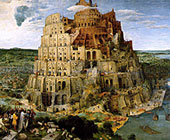 [div class=attrib]From Eurozine:[end-div]
[div class=attrib]From Eurozine:[end-div]
Each nation establishes its borders, sometimes defines itself, certainly organises itself, and always affirms itself around its language, says Marc Hatzfeld. The language is then guarded by men of letters, by strict rules, not allowing for variety of expression. Against this backdrop, immigrants from ever more distant shores have arrived in France, bringing with them a different style of expression and another, more fluid, concept of language.
Today more than ever, the language issue, which might at one time have segued gracefully between pleasure in sense and sensual pleasure, is being seized on and exploited for political ends. Much of this we can put down to the concept of the nation-state, that symbolic and once radical item that was assigned the task of consolidating the fragmented political power of the time. During the long centuries from the end of the Middle Ages to the close of the Ancien Régime, this triumphant political logic sought to bind together nation, language and religion. East of the Rhine, for instance, this was particularly true of the links between nation and religion; West of the Rhine, it focused more on language. From Villers-Cotterêts[1] on, language – operating almost coercively – served as an instrument of political unification. The periodic alternation between an imperial style that was both permissive and varied when it came to customary practise, and the homogeneous and monolithic style adopted on the national front, led to constant comings and goings in the relationship between language and political power.
In France, the revocation of the Edict of Nantes by Louis XIV in 1685 resolved the relationship between nation and religion and gave language a more prominent role in defining nationality. Not long after, the language itself – by now regarded as public property – became a ward of state entitled to public protection. Taking things one step further, the eighteenth century philosophers of the Enlightenment conceived the idea of a coherent body of subject people and skilfully exploited this to clip the wings of a fabled absolute monarch in the name of another, equally mythical, form of sovereignty. All that remained was to organise the country institutionally. Henceforth, the idea that the allied forces of people, nation and language together made up the same collective history was pursued with zeal.
What we see as a result is this curious emergence of language itself as a concept. Making use of a fiction that reached down from a great height to penetrate a cultural reality that was infinitely more subtle and flexible, each nation establishes its borders, sometimes defines itself, certainly organises itself, and always affirms itself around its language. While we in Europe enjoy as many ways of speaking as there are localities and occupations, there are administrative and symbolic demands to fabricate the fantasy of a language that clerics and men of letters would appropriate to themselves. It is these who, in the wake of the politicians, help to eliminate the variety of ways people have of expressing themselves and of understanding one another. Some scholars, falling into what they fail to see is a highly politicised trap, complete this process by coming up with a scientific construct heavily dependent on the influence of mathematical theories such as those of de Saussure and, above all, of Jakobson. Paradoxically, this body of work relies on a highly malleable, mobile, elastic reality to develop the tight, highly structured concept that is “language” (Jacques Lacan). And from that point, language itself becomes a prisoner of Lacan’s own system – linguistics.
[div class=attrib]From theSource here.[end-div]
